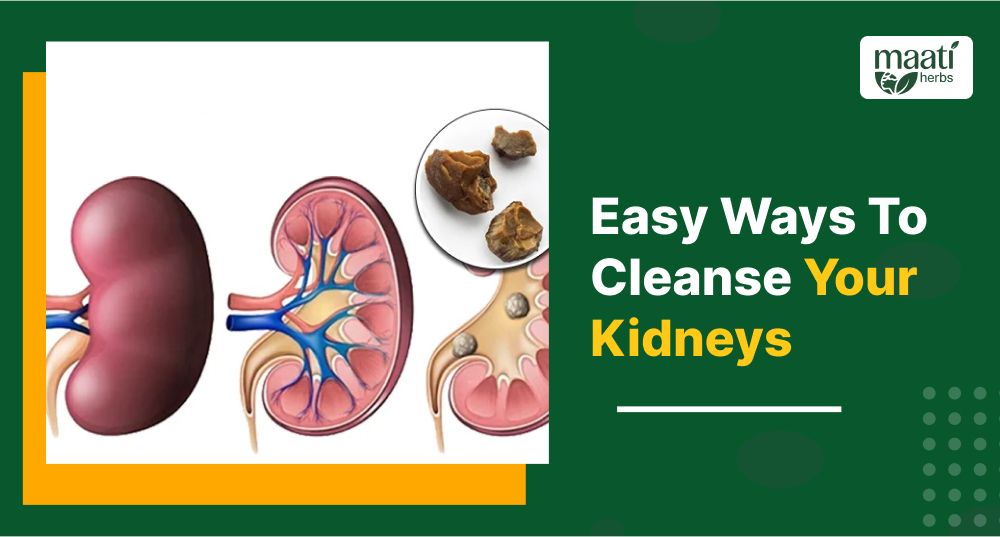Easy Ways to Cleanse Your Kidneys
Kidneys are essential organs, about the size of your fist, positioned just beneath the rib cage on each side of your backbone. They may be considered quite tiny, yet their impact on the preservation of the overall health is simply monumental.
These complex organs, which are often not given a thought until something goes wrong, serve as the extremely advanced filtration system of the body, filtering approximately 120-150 quarts of blood daily to eliminate waste products, unnecessary water and toxins. They control blood pressure, produce hormones that are vital in the production of red blood cells, keep bones healthy and regulate important body electrolytes such as sodium, potassium and calcium.
Our kidneys have to constant struggles in the busy life of 2025 with a number of factors including our diets (high sodium content, processed food), lack of water, some medications, environmental toxins, and chronic disorders such as diabetes, and hypertension. Although the kidneys are amazingly effective in their work, regular support is the major factor that might guarantee their long-term well-being and efficient functioning. The idea of cleaning the kidneys is not to do a radical and single flash but to integrate sustainable daily habits that will facilitate their task and promote their natural filtration capacity.
1. Remain Properly Hydrated
Water is the most vital substance for maintaining kidney function. It's the vehicle by which your kidneys clean out waste and toxins from your bloodstream.
How it benefits the kidneys: Drinking enough water helps keep your kidneys well-hydrated so that they can effectively flush out metabolic waste products (such as urea and creatinine) from your blood and pass them out as urine. If you're dehydrated, urine concentrates more, making kidney stone formation more likely and putting extra strain on the kidneys. Adequate hydration also contributes to proper blood pressure, which is essential for kidney health.
Practical tip: Try to consume at least 8-10 glasses (about 2-2.5 liters) of clean, filtered water every day. Your requirements can be different depending on activity level, weather, and health factors. Observe the color of your urine; it should be pale yellow. Having a big glass of water in the morning can help get your hydration going. Be careful not to consume too many sweet drinks, which are poor for kidney health.
2. Embrace a Balanced, Whole-Food Diet
Your dietary choices directly impact your kidney's workload and health. A diet rich in whole, unprocessed foods provides the necessary nutrients while minimizing harmful burdens.
Focus on Fruits and Vegetables: These are packed with antioxidants, vitamins, and fiber.
Berries: Blueberries, cranberries, and raspberries contain high levels of antioxidants and substances which can inhibit UTIs, indirectly influencing kidney health. Unsweetened cranberry juice is specifically recognized for this.
Cruciferous Vegetables: Broccoli, cauliflower, cabbage, and Brussels sprouts are low in potassium and phosphorus, are kidney-friendly, and contain vital nutrients.
Bell Peppers: Bell peppers contain high levels of Vitamin C and antioxidants.
Onions and Garlic: Have chemicals that could possibly be beneficial to kidney health and are good taste enhancers, reducing the need for salt.
Select Lean Proteins: Although protein is vital, excessive amounts can burden the kidneys. Make lean protein choices such as fish, poultry, eggs, and vegetable proteins (legumes, tofu) in moderation.
Whole Grains: Brown rice, quinoa, and oats give fiber and energy without too much sodium or phosphorus that commonly occur in processed grains.
Restrict Processed Foods: They tend to have high amounts of sodium, phosphorus, and bad fats, all of which strain the kidneys.
Regulate Sugar Intake: Excessive consumption of sugar contributes to diabetes and obesity, both being key risk factors for kidney disease.
Why it is good for the kidneys: A well-balanced diet gives the kidneys everything they require to work well while minimizing the amount of substances that may harm them or place extra load on them.
3. Cut Down Sodium Consumption
Overconsumption of sodium (salt) is a principal offender in high blood pressure, a primary cause of kidney injury.
How it benefits the kidneys: Kidneys laboriously filter out sodium from the blood. Excess sodium levels compel them to retain additional water in order to dilute the sodium, resulting in increased blood volume and, in turn, blood pressure. Eventually, high blood pressure can cause the delicate blood vessels in the kidneys to get damaged, weakening their filtration capabilities. Lowering sodium directly decreases this load.
Practical tip: Restrict processed and packaged foods since these are concealed sources of sodium. Be vigilant about reading food labels. Season meals using herbs, spices, lemon juice, and vinegar in place of salt. Prepare more meals at home to have control over ingredients.
4. Manage Blood Pressure Effectively
Increased blood pressure (hypertension) is the second most common cause of kidney failure.
How it benefits the kidneys: Unregulated high blood pressure causes the arteries, including those that bring blood to the kidneys, to narrow and stiffen. The damage slows blood flow, making it more difficult for the kidneys to remove waste products. Controlling blood pressure with diet, exercise, and medication (if needed) shields these important vessels.
Practical advice: Take your blood pressure levels regularly. Use a DASH (Dietary Approaches to Stop Hypertension) diet that includes plenty of fruits, vegetables, whole grains, and lean proteins with minimal sodium and unhealthy fats. Take regular exercise and follow any medication as prescribed.
5. Manage Blood Sugar Levels
The number one reason for kidney failure is diabetes. High blood sugar hurts the tiny blood vessels in the kidneys over time.
How it benefits the kidneys: Constantly elevated blood glucose levels cause the kidneys to work extra hard to remove excess sugar. This excessive strain over years damages the small filters in the kidneys (glomeruli), and they lose effectiveness. Proper control of blood sugar through diet, exercise, and drugs avoids or delays this damage.
Practical advice: If you are diabetic, strictly adhere to your regimen, test blood sugars, and make lifestyle decisions that maintain them at equilibrium. If you're predisposed, eat well and exercise regularly to avoid developing type 2 diabetes.
6. Don't Overuse Over-the-Counter (OTC) Painkillers
While easy, some OTC painkillers hurt kidneys when taken excessively or on the long term.
How it affects the kidneys: Nonsteroidal anti-inflammatory drugs (NSAIDs) such as ibuprofen and naproxen, if they are taken daily or in large doses, can decrease blood flow to the kidneys, leading to acute or chronic damage of the kidneys, particularly in people who already have kidney disorders.
Practical tip: Use NSAIDs sparingly and only for short periods. Always follow dosage instructions. If you need pain relief regularly, consult your doctor for kidney-safe alternatives. Never combine multiple NSAIDs.
7. Incorporate Kidney-Supportive Herbs and Foods
Certain natural ingredients have properties that may help support kidney function and reduce the risk of kidney stones.
Dandelion: Both the root and leaves are long-standing diuretics that assist in the flow of urine and potentially removing toxins from the body. Dandelion tea is a popular option.
Parsley: A natural diuretic with antioxidant benefits, parsley is able to stimulate urine flow.
Ginger: Anti-inflammatory and antioxidant, ginger can assist in maintaining overall organ health.
Turmeric: Curcumin, the active anti-inflammatory compound found in turmeric, may have protective effects on the kidneys.
Stinging Nettle: Used as a diuretic and can prevent kidney stones.
Celery Seeds: Have diuretic properties and are utilized in traditional medicine for bladder and kidney conditions.
Supplement Note: You might find products labeled as kidney cleanser tablets or kidney detox tablets that are a combination of these herbs. Although some herbs hold promise, scientific proof of their use as independent "detoxifiers" or "repair" drugs is usually weak, particularly in human trials. It's important to note that these are complementary therapies, not substitutes for medical care.
The phrase "best tablets for kidney repair" is misleading, since severe kidney injury can only be treated medically, not with supplements. Always have your doctor's approval before initiating new supplements since some herbs have the ability to interact with medications or cause harm in particular conditions (e.g., if you already have kidney disease). Seek out good brands that have third-party testing.
8. Regular Physical Activity
Exercise is beneficial for virtually all systems in the body, and the kidneys are no different.
How it benefits the kidneys: Keeping a healthy weight, which regular exercise contributes to, decreases the risk of diabetes and high blood pressure – two of the main causes of kidney disease. It also enhances circulation, providing proper blood flow to the kidneys, and may reduce inflammation in the body.
Practical advice: Target a minimum of 150 minutes of moderate-intensity aerobic exercise each week (brisk walking, jogging, cycling). Include strength training two to three times a week. Even a simple thing like a daily walk counts a lot.
9. Stop Smoking
Smoking is a major risk factor for a variety of chronic diseases, including kidney disease.
How it benefits the kidneys: Smoking harms blood vessels all over your body, including in your kidneys. This can decrease blood flow and weaken the kidneys' function. It also helps cause high blood pressure and speed the progression of kidney disease. Quitting smoking is among the most effective things you can do for your kidneys and overall health.
Practical tip: Get help from your physician, quit programs, or nicotine replacement products to quit.
10. Deal with Stress in a Healthy Way
Chronic stress can indirectly affect kidney function by affecting blood pressure and inflammation.
How it benefits the kidneys: Chronic stress can cause high blood pressure and systemic inflammation, both of which can be taxing to the kidneys. By keeping your stress levels in check through positive coping habits, you stabilize these elements, thus lessening the workload on your kidneys.
Practical tip: Integrate stress-reducing activities into your daily life, like meditation, yoga, deep breathing, time in nature, hobbies, or talking to loved ones.
11. Don't Overuse Antibiotics and Talk to Your Doctor About All Drugs
Antibiotics are essential for fighting bacterial infections, but overuse can have unforeseen consequences.
How it benefits the kidneys: Certain antibiotics, when used inappropriately or for extended durations, can be nephrotoxic (toxic to the kidneys), particularly in patients with a background of kidney susceptibilities. The kidneys get rid of many drugs from the body, and an improper or excessive amount of medication loads their responsibility.
Practical tip: Always finish the complete course of antibiotics prescribed and never take antibiotics or self-medicate. Alert your doctor to all medications and supplements you are consuming, including over-the-counter medications, to prevent toxic interaction or overload on the kidneys. Check-ups with your doctor regularly are important, particularly if you have risk factors for kidney disease.
Conclusion
Your kidneys are vital organs, working tirelessly every second of each day to clean and balance your body. "Cleansing" the kidneys is better described as a promise to regularly assist their natural, ongoing filtration functions with healthy and sustainable lifestyle options.
By placing top priority on proper hydration, adopting a balanced, whole-food diet, closely monitoring blood pressure and blood glucose, making informed decisions regarding the use of medications, regularly exercising, and proactively managing stress, you give your kidneys their best environment in which to excel.
Although kidney cleanse tablets or kidney detox tablets made with herbs such as dandelion or milk thistle (which is mostly for liver health but in many cases included with detox supplements) can be found, it's important to keep in mind that they are support tools and not replacements for basic healthy habits or specialized medical treatment.
No magic "best tablets for kidney repair" exists that can reverse extensive damage; true kidney repair is often the result of medical treatment and strict adherence to lifestyle. Always consult a qualified medical practitioner prior to adding any supplements, particularly if you suffer from pre-existing kidney issues or concerns. Taking care of your kidneys in these simple, natural methods is a strong investment in your future health and well-being, enabling these vital organs to continue their important work for years to come.




